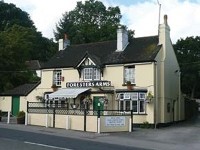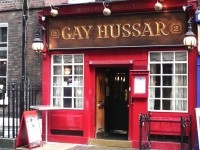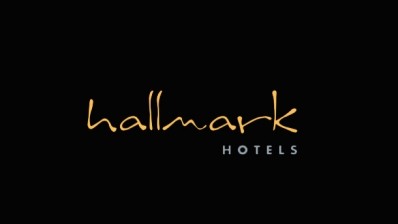Business Outlook 2014: What’s in store for hospitality?

These are just some of the conclusions of Christie & Co’s annual Business Outlook, which studies price information across the hospitality industry over the past 12 months and looks at potential trends and developments for the year ahead.
According to the Outlook, which was released this morning (15 January), all three sectors benefitted from economic improvement, with an increase in buyer demand often causing businesses to be sold for above their initial asking price.
Pubs
A record number of pubs sold for ongoing use and a 3.3 per cent increase in the average sale price of properties made 2013 a ‘confident year’ for the sector.

According to Christie & Co’s Business Outlook, there were signs that big, tenanted pubco churning slowed last year as companies reached a point of satisfaction with their estates, having disposed of the majority of their bottom-end properties.
Interestingly, despite continued warnings about the rate of pub closures from pressure groups and from inside Parliament, there is evidence that the closure rate declined in 2013. Moreover, the percentage of pubs remaining as pubs when they were sold reached 67 per cent – five per cent up on 2012.
Add to this the increasing trend of pubs being acquired by experienced operators and the growing number of entrepreneurs returning to the sector and there is every reason for confidence in the sector this year.
So says Christie & Co’s head of pubs Neil Morgan, who believes the quality of pubs coming to market is constantly improving.
“2013 sent a strong signal that the pub sector is picking up, both in the trading performance of single units and companies and in the values being achieved by pubs that are being places on the market – even those that are in distress.
“As we move into 2014, this state of affairs will alert and offer encouragement to those who are looking to either add to their estates of seeking a return or first-footing in a sector which is looking to grow evermore vibrant and stable.”
Amidst the optimism, Morgan did sound a note of caution for the year ahead. “While trading performance seemed to improve in general terms, the better results were geographically predicated,” he said.
“London remained in its own bubble trading-wise, and also so most of the higher premiums paid for pubs. Elsewhere the UK regions rather reflected the ‘recession recovery effect’ – the belief that recession starts in the north and recovery in the south was certainly mirrored in the trading performance of pub companies."
Restaurants‘The restaurant sector was probably less affected by the recession than even those operating within it had possibly expected’, reads today’s Business Outlook report.

Like-for-like sales increased across the board in 2013, with new restaurant openings rising by over 11 per cent amidst a backdrop of growing private equity activity.
“With low interest rates and lowish inflation, the consumer continued to support the sector – buoyed by prices remaining at affordable levels and an ever-expanding palate of interesting cuisines,” said Christie & Co’s head of restaurants Simon Chaplin.
“In fact, it’s hard to remember a time where diners had so much regional and geographical choices of food experience.”
Looking ahead to 2014, Christie & Co believes the big brands will increasingly dominate the restaurants scene in 2014 – and their influence in the thriving London market could well be replicated in the UK regions.
“Whether independent operators and small local and regional groups can keep pace and compete with the power of the private-equity-backed brands will be interesting to observe,” added Chaplin.
“The London scene reflects this cosmopolitan and eclectic approach already, but we envisage these tastes of the ‘unique’ moving increasingly into the regions throughout 2014.
“However, brandless, imageless and dated traditional restaurant concepts are likely to find themselves under yet further pressure in 2014 – not just from branded rival restaurants but from the broader food offering emanating from the higher quality pub chains.”
HotelsAfter a year which saw the average sale price of UK hotels increase by 5.7 per cent, there remains a ‘substantial amount’ of equity looking for opportunities in the sector in 2014.
2013 began with a ‘big bang’ of portfolio transactional activity: -
- Private investment firm Starwood Capital Group expanded its reach into the European hotel market after buying the 23-strong hotel, conference and training venue operator Principal Hayley.
- Abu Dhabi Investment Authority acquired 42 Marriott hotels across the UK controlled by the Royal Bank of Scotland for £640m.
- KSL Capital Partners, the US company which bought The Belfry last year, acquired Malmaison and Hotel du Vin owner the Malmaison Group for an estimated £180m.
The second half of the year saw a shift back towards single-asset deals, which represented 65 per cent of transaction volume. The only notable portfolio deal in the latter part of 2013 was the acquisition of 12 properties from the Menzies Hotels portfolio by international property and investment firm The Topland Group for more than the initial £80m asking price.

London’s ‘safe-haven’ status was reaffirmed as it remained at the forefront of major deals and highest prices, but even in the UK regions — especially where quality assets came to market — values were maintained.
The strategies of the banks seem set to boost the hotel market still further in 2014, as Christie & Co’s head of hotels Jeremy Hill points out.
“Much will depend, of course, on the levels to which the banks will be inclined to take part, but the transactional environment will see some further upturn as more consolidation looms and further brand roll-out through franchise modelling takes place,” said Hill.
“This, in tandem with the still increasing demand from those with cash to invest, should see the potential for selective hotel value increases, both in and outside of London, even if trading remains relatively stable in these times of economic transition.”
Christie & Co’s Business Outlook concludes that the emergence of new brands on the back of product development - such as Premier Inn’s introduction of Hub, Z Hotels, Sleeperz and Citizen M in 2013 - will become increasingly vital in 2014 if operators are to see off the growing threat of online travel agents’ grip on pricing and margins.
Business Outlook 2014: Full report


















